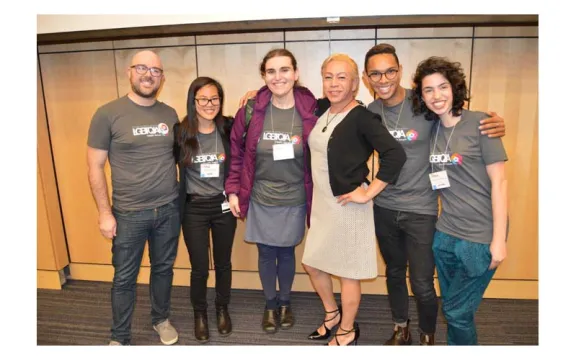
We Need Resources, Not Saviors: LGBTQIA+ Forum
The LGBTQIA+ community is one with distinct needs, risks, and disparities in healthcare, but what can we do to address these issues?
The LGBTQIA+ Health Forum, held on Feb. 24 at UCSF’s Mission Bay campus, was an enlightening experience that highlighted gaps in knowledge for caring for the LGBTQIA+ community, and provided a roadmap for the future.
As one panelist put it, “We don’t need a savior, we need resources.”
The forum, was a full 10-hour day of sessions dedicated to educating attendees on current healthcare research, ongoing needs, and best practices for serving the LGBTQIA community.
Revolutions in Transgender Health
The forum opened with a plenary session entitled, Revolutions in Transgender Health, which discussed the past, present, and future of transgender health and representation, a topic that was given emphasis in sessions all throughout the forum.
Panelists Jenna Rapues, Interim Director of the Center of Excellence for Transgender Health (CoE), Cecilia Chung, Senior Director of Strategic Projects at the Transgender Law Center, and Luis Gutierrez-Mock, TRIUMPH Project Director at the CoE.
The main revolution in trans research and trans patient care is that it’s gone from nearly nonexistent to something tangible and active. That’s not to downplay the importance of the steps made thus far – for one of the most oppressed populations in the nation, finally gaining some momentum is its own revolution.
In decades past, there was little in the way of guidelines for clinicians on how to interact with trans people. Trans women were classified as men who have sex with men (MSM), and research on health outcomes was strictly limited to HIV risks. With high mortality and little sympathy in popular media, there was also a scarcity of elders to turn to for young trans people.
One panelist said the only trans people they saw on TV were either on Jerry Springer, Maury Povich, or Law and Order SVU as a dead hooker.
Today, transgender research stretches beyond HIV, and in moving a generation forward with better healthcare and visibility, there is a growing number of trans elders, which raises its own issues regarding competent care. Because trans is now being acknowledged as an identity and not a disorder, and parents are becoming increasingly supportive of their children’s decisions to transition, a new frontier of trans care has emerged that focuses on the needs of younger populations.
But of course, there’s still a long way to go. HIV rates have been relatively stagnant for a group with an already high risk; racial disparities in health persist; violence against trans individuals continues to be an everyday problem; and the current administration isn’t doing any favors for ongoing stigma and discrimination against trans people.
Today’s broader scope of research is promising, but immediate issues remain, such as assessing drug interactions for those transitioning and taking medication, and examining risks of major diseases within the transgender population.
The way forward, the panelists assert, is to remember who’s steering the ship. Keep the community informed, have them lead, and center trans voices every step of the way.
Patient Panel
The next session was a more informal panel titled Caring for Queer Communities, led by CoE Interim Director Roman Rimer, Clinical Psychology Ph.D. student Anthony Lucas, CoE Capacity Building Assistance Provider Christina Quiñonez, and make-up artist/event producer/host Mark Jacques (AKA Sister Flora Goodthyme).
The panel was asked to talk about their negative and positive experiences with healthcare providers.
The negative experiences illustrated egregious lapses in cultural competency: mis-gendering of patients, deflecting issues of body dysphoria when counseling trans individuals, slut-shaming, and disclosing one’s HIV status for the whole waiting room to hear. And these are often repeated traumas.
For the positive experiences, the panelists emphasized how much they valued being given kind bedside manner and when a doctor gave up space to them, effectively relinquishing some power to the patient.
“Whenever a doctor neutralizes the power dynamic, the patient is more able to advocate for themselves,” Lucas said, recalling in his own work how one patient only truly started feeling comfortable when he began to open up about himself.
Their message for improving care? Teach people humility and compassion. Get to know your patients, don’t make assumptions, and find equal ground with the patient to speak.


